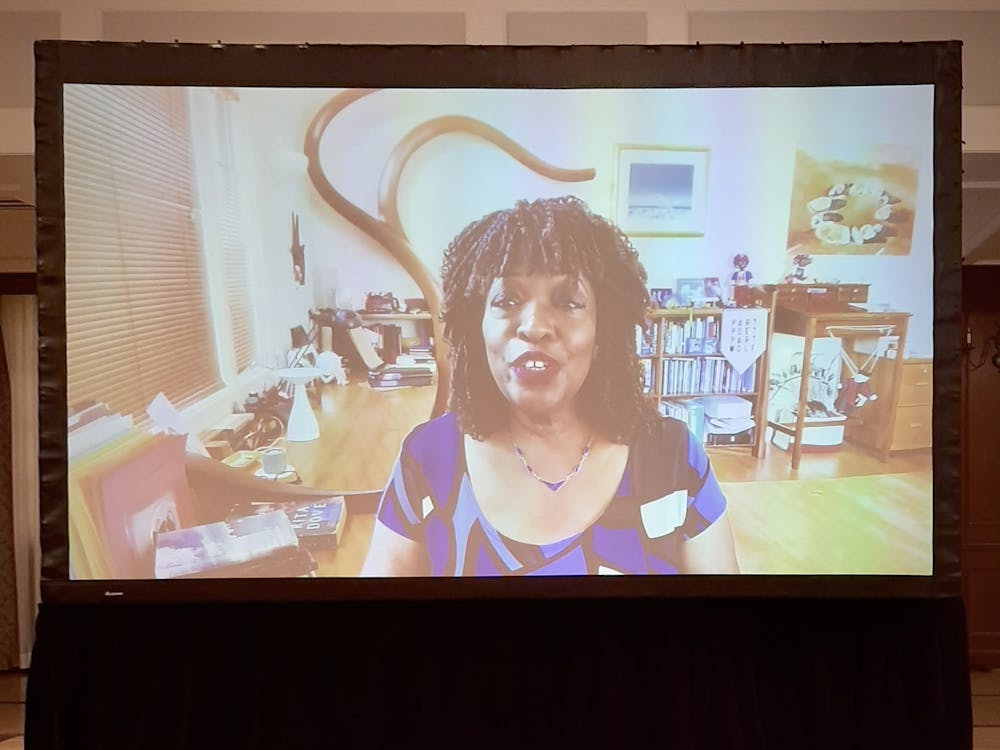The buckeye. Ohio’s state tree inspired Miami University alumna Rita Dove, America's first Black Poet Laureate and winner of both the National Medal of Arts and National Humanities Medal. She found poetry in both the buckeye and a myriad of other earthy topics during “A Conversation with Rita Dove,” an event held on Miami’s campus on Thursday, April 25.
In a retelling of her early life about poetic discovery, inspiration and her ongoing career, Dove told tales of both ammunition, appointed buckeyes and library adventures, and anecdotes of strutting professors and drunk Pulitzer poets alike.
Dove’s stories illustrated numerous evocative anecdotes. Her musings about the state tree of Ohio, “its fruit so useless, so ugly, that no one bothered to commend the smudged trunk nor the slim leaves shifting overhead,” segues into a cheery story about them being “good things to kick into gutters on the way home,” and then a thoughtful musing on finding the beauty in something so insignificant.
Aside from fun with buckeyes, Dove told of another great portion of her childhood: the library.
“There was so much to discover about the world, the language of flowers, and the place of women in the tribes of Mali,” Dove said. “I could walk any aisle and smell wisdom, put my hand out to touch the bluff curve of bounds over the harsh parchment of dreams.”
Beyond her childhood, Dove spoke about her experience in young adulthood at Miami, including her description of five professors that she feels most aided her in her realization as a poet and writer: Milton White, James Reese, Dan Flores, Elizabeth Parker and Mary Wiffel. Dove also praised Miami’s core curriculum requirements as a major reason for her being able to meet these professors.
In particular, Dove said White stood out to her through his colorful suits and the way he taught his class. White posed for the class, describing not only his suit, but the “creation story” of it, of “men and women alike who had cut and sewn at the factory” to turn disparate threads of silk into that suit. The connections between the weaving of a suit and the writing of short stories was like “a honey pot” to Dove, “reading stories and then writing vinyl.”
Another occurrence that happened during Dove’s time as a Miami student was the arrival of Maxine Cuban, a poet who had just received, in the spring of 1973, the Pulitzer Prize for her book of poems of country. One of Dove’s friends introduced her to Cuban, who had already read some of Dove’s poetry.
“She smiled one of the warmest smiles I had ever seen, and said that she had read my poems and was impressed,” Dove said.
At the end of her speech, Dove answered questions from a panel of three Miami members, Naya Hodge, professor Stephanie Dunning and professor Keith Tuma as well as numerous students. These questions ranged from asking how her environment had impacted her writing, to the inspirations behind her raunchier poems and works.
Students that had attended the event came away enlightened and satisfied with what they had heard from Dove, such as Cheyenne Worrel and John Day,
“As a woman of color who is a writer, I came just to see somebody else doing the same as I was,” Worrel said. “If I’ve learned anything, it’s definitely to keep writing.”
Enjoy what you're reading?
Signup for our newsletter
Day echoed the value of his afternoon with Dove.
“Her description of her backyard as a ‘red cauldron in the fall and a green cathedral in spring’ is definitely something that will stay with me for a while,” Day said. “The experience was really peaceful and motivating.”




